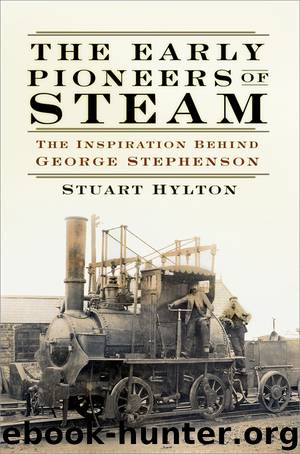The Early Pioneers of Steam by Stuart Hylton

Author:Stuart Hylton
Language: eng
Format: epub
Publisher: The History Press
It was a public toll railway, on which independent hauliers used their own horses and wagons. The company did not operate its own trains. The railway had a gauge of 4ft 2in (127cm) and a spacing of about 5ft between the centres of the stone blocks on which the rails were mounted. The coming of faster, more powerful and heavier steam locomotives spelt the end for horse-drawn railways. William James, a shareholder, tried to persuade George Stephenson to provide a steam locomotive but Stephenson declined, on the grounds that the cast-iron plateway would not bear the weight of a locomotive. Attempts were made to sell the railway to the London and Brighton Railway, so that they could use part of its route to extend their own trackbed. But the sale was not completed and in August 1846, with Parliament’s blessing, the railway was closed.
Oystermouth Railway (1806), the world’s first passenger railway service, was built under an 1804 Act of Parliament to carry limestone from a quarry at Mumbles, and coal from the Clyne Valley, to Swansea. From there it would be transhipped to the Swansea Canal and other markets. It was called the Oystermouth Railway after a tiny fishing village along the route. One of the leading lights in its promotion was the copper and coal magnate John (later Sir John) Morris, Bart. The enabling act permits haulage by ‘men, horses or otherwise’ – a fairly common form of wording on Railway Acts of this era, though the founders can surely have had no other option but horse power in mind. But, oddly enough, a short-lived attempt was actually made to run the railway by sail power.
Download
This site does not store any files on its server. We only index and link to content provided by other sites. Please contact the content providers to delete copyright contents if any and email us, we'll remove relevant links or contents immediately.
Hit Refresh by Satya Nadella(9110)
When Breath Becomes Air by Paul Kalanithi(8413)
The Girl Without a Voice by Casey Watson(7876)
A Court of Wings and Ruin by Sarah J. Maas(7797)
Do No Harm Stories of Life, Death and Brain Surgery by Henry Marsh(6927)
Shoe Dog by Phil Knight(5243)
The Rules Do Not Apply by Ariel Levy(4946)
A Higher Loyalty: Truth, Lies, and Leadership by James Comey(4942)
Hunger by Roxane Gay(4918)
Tuesdays with Morrie by Mitch Albom(4756)
Everything Happens for a Reason by Kate Bowler(4724)
The Immortal Life of Henrietta Lacks by Rebecca Skloot(4567)
Millionaire: The Philanderer, Gambler, and Duelist Who Invented Modern Finance by Janet Gleeson(4452)
How to Change Your Mind by Michael Pollan(4340)
All Creatures Great and Small by James Herriot(4297)
The Money Culture by Michael Lewis(4178)
Man and His Symbols by Carl Gustav Jung(4118)
Elon Musk by Ashlee Vance(4112)
Tokyo Vice: An American Reporter on the Police Beat in Japan by Jake Adelstein(3967)
